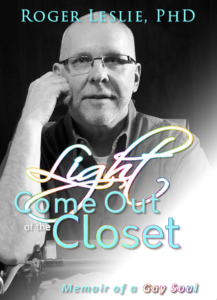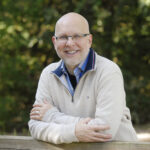Today’s special guest is Roger Leslie, PhD and we’re chatting about his LGBTQA+ memoir, Light Come Out of the Closet: Memoir of a Gay Soul.

Bio:
Dr. Roger Leslie is an author, editor, publisher, and inspirational teacher. He discovered his life’s mission following the light that emerged from his youthful struggle to reconcile his sexual orientation with his spirituality. Once he found his soul, he has lived from it to inspire people to live the life they dream and empower them to follow their unique spiritual destiny.
What inspired you to write this book?
For many years, I avoided reflecting on the painful years in my youth and teens as I struggled to reconcile my efforts to be a good human being with messages I was getting from my family, religion, and society about being gay. Recently, I realized that the dark night of the soul I lived through in that period must have provide treasures that helped me become the man I am. So, I explored the journey I took from the scared, berated young boy to the young man ready to come to terms with who I always was.
Excerpt from Page 1:
Chapter 1. I’m Going to Hell
Before I was old enough to articulate them as defining truths, I have known three absolutes:
I love God.
I love my family.
I am gay.
The sliver of the world I knew in childhood consistently supported those first two insights. I was raised by parents so committed to our religious upbringing that Dad worked extra to send my sister, brothers, and me to Catholic school. In my close-knit, Polish-American enclave, the family unit was paramount. Loving God and loving my family came with a guarantee: who I loved loved me in return. Though it remained unspoken, I always belonged. Then I awakened to a frightening suspicion. My third truth—that I am gay—could negate my assumption that love was automatically reciprocal. As the truth of my sexual identity clarified for me, so did the possibility that my family might not love me gay. But an intense terror loomed more threateningly in my waking life as a child and my hours of prayer as a young soul: What if being gay meant that God wouldn’t love me either? All the affections and desires for love that felt natural to me, as a child of God made by God’s hand in the image and likeness of God, seemed at odds with what the world and my religion suggested was honorable and spiritual.
I have always known I am gay. Even before I understood what that meant, I sensed that I was different from everyone else I grew up around, even my own family.
When did you first consider yourself a writer?
I LOVE this question because it addresses a fundamental quandary among artists. I knew from the time I was 13 that being an author was my destiny. Throughout high school, college, and the first years of being a high school literature teacher, I wrote consistently and worked doggedly to get published. In my late 20s, I still did not have a single book published.

One day I was filling out a form at an eye doctor’s office. When I reached the line that said Occupation, I didn’t write “Teacher,” even though that was my only source of income. I decided one reason I might not be reaching the success I was seeking as an author was because I was not declaring who I was. For the first time, on the form I wrote “Author.” Although I had quietly considered myself one for years, it wasn’t until that day I put it in writing for the world to see. That simple declaration shifted my own perception of who I was and what I could achieve. Publication followed soon after.
Do you write full-time? If so, what’s your workday like? If not, what do you do other than write and how do you find time to write?
Yes, I write full-time. Over the years, I have developed routines that I teach others to create for themselves. I call them “Practices.” I recommend that everyone create daily practices that determine your success. I love acronyms, so I call mine, “Getting in the PEW.” Every workday, before I do any other business tasks such as answering emails or talking to my publicist, I
- Pray
- Exercise
- Write
I encourage everyone to be flexible about how they complete their practices. For example, my prayer work may take 30 minutes, or I might pray a few hours. For exercise, I may do cardio, yoga, or weights. For my writing, I usually set a word limit for how much I’ll complete that week. (5,000 is a minimum.) So long as I’ve gotten in the PEW, I can rest at night knowing I’ve had a productive day fulfilling my mission in this life.
What would you say is your interesting writing quirk?
When I meditate before writing, I invite my characters to counsel me on what they want to do and why they want to do it in whatever section I’m writing that day. I perceive it as a read-through that actors might engage in before blocking a play. They gather to read through their lines and discuss what they are saying, what their character motivations might be, and how they might express lines in different ways for maximum emotional impact. Once I sit down to write, I feel more like a stenographer recording the notes of the characters’ meeting than an artist struggles to create something beautiful and powerful on my own.
As a child, what did you want to be when you grew up?
Since I was 13, I knew I was destined to be an author. I didn’t know if I had the talent to succeed. Because I didn’t know any authors, I had no idea how to make a living at it. But I felt called to create through words. It’s a challenge that has sustained me for nearly fifty years.
Anything additional you want to share with the readers?
To live the life you dream requires first that you have a dream. Many people instinctively know what their dream is, but some avoid pursuing it because it feels daunting. I say, take inspiration to action. Just start doing whatever you feel led to do. Once you’ve taken that first step in your journey, you will be so captivated by the adventure, you will wake every day excited and eager to continue.
